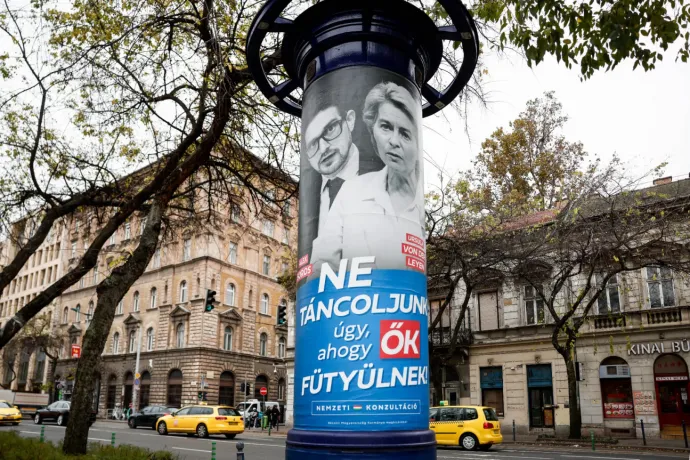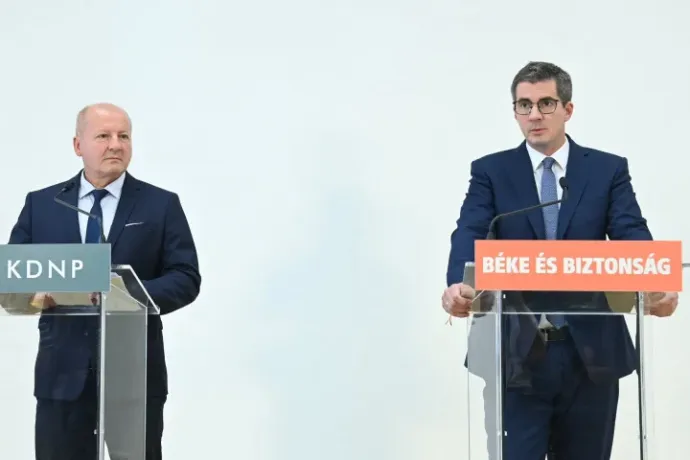Hungarian parties and candidates accepting campaign contributions from abroad could soon face up to three years in prison

The parliamentary group of Hungary's bigger governing party tabled a legislative package called the Sovereignty Protection Bill on Tuesday evening. They intend to set up a Sovereignty Protection Authority and punish anyone accepting campaign contributions from abroad with a prison sentence.
The main points of the package were already presented by group leader Máté Kocsis at a private conference of Századvég Alapítvány last Monday. Fidesz is proposing to amend four laws:
- In the Fundamental Law, they would expand the part on the protection of constitutional identity and the one on the protection of Christian culture with a section on the recognition of sovereignty;
- In the Election Law, the scope of the regulations applicable to political parties would be broadened to include NGOs and election candidates, so that all those running in an election would have to comply with the same laws.
- The Criminal Code would include the criminal offense of accepting foreign funding as a member, representative or officer of a candidate organisation standing for election. Following the adoption of the amendment, such an act would be punishable by imprisonment of up to 3 years.
- A separate institution would be set up to protect sovereignty and investigate processes suggesting foreign interference.
According to MTI, speaking at the private conference, Fidesz' group leader also said that "those on the side of national sovereignty" do not have a beef with the political left, but with the leftist media. Although the foreign financing of the media is also a concern, Kocsis said that "serious funding that can be used for elections is coming through NGOs", and therefore the proposed sovereignty protection package does not address the regulation of this issue in the media.
A few days ago, Viktor Orbán told members of the Council of the Hungarian Diaspora that the next 10-15 years will be about defending sovereignty both in Hungary and in many other parts of the world.
"A big debate is expected on the Povereignty protection Act which is to be submitted to Parliament soon, but we must establish clear prohibitions in order to prevent foreign money from influencing Hungarian elections"
– Orbán said, according to MTI.
“We want to make things hard for them”
"Sovereignty protection" became the government's new goal at the end of September, following the Fidesz-KDNP coalition's off-site parliamentary group meeting. At the time, Fidesz' group leader Máté Kocsis said that he believed that Hungary's sovereignty was under attack in the areas of culture, economy and politics. He then announced that the work of "foreign-funded journalists, pseudo-NGOs and dollar-funded politicians" would be curtailed by new rules as early as this autumn.
The Fidesz group leader said that Hungary’s economic sovereignty was being attacked by the EU when it tries to tell the country what economic decisions it should take. According to Kocsis, the abolition of cultural sovereignty is reflected in the EU's policy on migration and in the attempts to "impose their gender ideology" on us. The new legislation is aimed at protecting political sovereignty from "the dollar-funded left" and "the dollar-funded media".
The Hungarian governing parties’ position is that the European Commission is "providing more money to left-wing organizations, NGOs, left-wing media outlets, dollar-funded NGOs, dollar-funded media and dollar-funded politicians than the Soros empire". Kocsis said that their goal is to "make things more difficult for those who are selling the country out in exchange for dollars", or as he put it: "we want to make things harder for left-wing journalists, pseudo-NGOs and dollar-funded politicians".

The government's new mantra, the phrase "dollar-funded left" was introduced last autumn, and has been repeated a million times since then. At first, it referred to politicians who had received donations from abroad, such as Péter Márki-Zay, who boasted in an interview that his movement had received hundreds of millions of dollars in contributions from the United States.
Since then, the government's vocabulary has expanded, and the term "dollar-funded left" was joined by the expressions "dollar-funded NGOs", "dollar-funded media" and "dollar-funded politicians". Up until now, the government has only threatened these politicians and organizations and labeled them as ones 'plotting against their homeland'.
Since the legislation was announced, Fidesz politicians and government officials have repeatedly pointed out that the government is protecting the "patriotic media". Foreign Minister Péter Szijjártó spoke about the "liberal mainstream" wanting to dominate the media. "According to the liberal mainstream, media freedom only exists if 99 percent of the media is liberal". He added: "Patriotic and conservative governments like ours have to stand up to this". Prime Minister Orbán argued that as long as liberal hegemony continues to dominate public thinking, Hungary will not be sovereign.
Orbán also spoke about his party’s realization in the wake of their defeat in the 2002 elections, namely that they realized that if the "liberal dominance" remained, the conservative side would only win elections by accident, with some good luck.
But what the prime minister failed to mention was that 'good luck' and 'accidental luck' had been so much in their favor in the last four parliamentary elections that, apart from one or two short periods, they have been enjoying a constitutional two-thirds majority in parliament throughout. In spite of this, according to Orbán, "liberal hegemony", i.e. the dominance of liberals is still prevalent in Hungarian public discourse.
For more quick, accurate and impartial news from and about Hungary, subscribe to the Telex English newsletter!